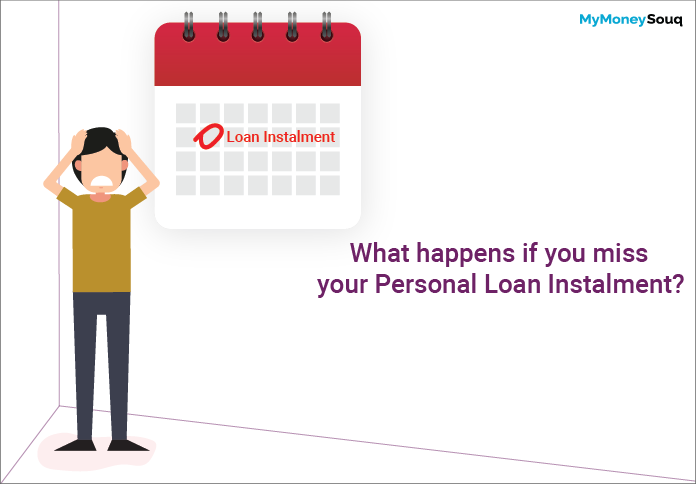The number of individuals choosing personal loans to finance their consolidated debts, travel and big purchases has been rapidly increasing over the past few years. As everyone is aware, personal loans are not secured loans that require minimum documents and are disbursed quickly. Banks and financial institutions come with an easy repayment method between 1 – 4 years and provide their customers with a chance of choosing the loan tenure that would be easier for them.
In Spite of choosing the most comfortable repayment tenure or EMI options, there are some situations in which borrowers will face difficulties in making the repayment of the monthly instalments. If payments are not made for one or two consecutive installments then it will not affect the borrower and not have any negative repercussions.
If a borrower misses paying loan instalment regularly or irregularly for over a period of time then it becomes a major default and has a negative impact on the credit report. On the other hand, if a borrower misses to pay one installment throughout the loan period and recovers to pay the remaining installments on time it becomes a minor default.
Types of loan defaults
Loan payment defaults are classified into two categories by the Banks and Financial Institutions they are Major defaults and Minor defaults.
Major defaults
If the borrower has not made the payment for more than ninety days it is considered a Major payment defaults and the loan account is called a non-performing asset. Banks hesitate to issue loans to borrowers who have major defaults on their record. It is a difficult and time consuming process to recover the negative impact on the credit score.
Minor defaults
If the borrower does not pay in less than 90 days it is considered a Minor payment defaults. Such borrowers can overcome the adverse impact on their credit score. Minor defaults are considered as a temporary set back as borrowers cannot make the payments on time.
Click here for What is a pre-approved Loan?
What happens if you miss monthly installment payments?
The following are the effects of missed payments.
Effect on Credit Score
The most crucial consequence of defaulting a loan payment is a decrease in your credit score. If an individual misses paying even one monthly instalment it can result in dropping the credit score of the borrower by 50 to 70 points. Once the borrower has a drop in credit score, new loans will not be issued. An ideal credit score of 750 or more should be maintained by the borrower to get credit from lending institutions.
Creditworthiness
Not only the credit rating, but a borrower’s credit report also have comments about the payment history. Even though the borrower’s credit score is above 750, the comments in the credit report are the reasons for the rejection of personal loans. Banks will look at these credit score figures and such borrowers will be termed as risky borrowers.
Click here to know about Best ways to make credit card payments in the UAE
Penalty
Most of the Banks levy penalties for the individuals who have missed paying their monthly instalments. The amount that is charged varies from each bank or institution but it is around 1% to 2% of the EMI that has to be paid.
Recovery agents
At times agents are sent by the Banks or Financial Institutions to recover the loan from the individuals if the borrower has not made the payment for more than 90 days. A 60 days notice period is given to the customer by the bank before the account is treated as a non-performing asset.
Ways to reduce loan defaults
As far as possible loan defaults must be avoided. The borrower must initially have a basic understanding that they will be able to repay the monthly instalments or not. There are few methods the borrower can consider to avoid penalty.
Plan better finances
To prevent or avoid defaulting on loans, the borrower’s must plan their loans more effectively.
Extend your loan term
You are the best judge of your financial situation, if you foresee tight financial situations in the future, it is best that you extend your loan tenure. By extending loan tenure you can reduce the monthly payment amount. Banks also can convert the unsecured loan into a secured loan, the monthly payment on the secured loan is less than the unsecured loan. Find out the best possible ways to reduce your monthly payment burden.
Partial payment
Another best option is to reduce the monthly installment payment is to make partial payments. Making partial payments will not only reduce the monthly payments but also reduces the principal amounts and the tenure of the loan gets reduced. This is possible only if the borrower has extra cash on hand for making the payment.
EMI free period
You can request a bank for EMI free period, banks provide this facility if there is a break in the flow of income with situations such as loss of job, set back in business and other financial crisis situations. Banks provide three to six months waiver on monthly payments and after the given period borrowers should continue to make the monthly payments.
About the author
Vinay Kumar Goguru is a finance professional with more than 8 years of diverse experience as a researcher, instructor and Industry work experience with both public and private entities. Prior to MyMoneySouq, he spent 6 years in Berkadia, It's a commercial mortgage banking company. He has a "Doctoral Degree in Commerce" and two master's degrees with a specialization in Finance, one as Master of Commerce and other as Master of Business Administration. He has written several articles on personal finance, published by different International journals. He loves traveling, reading and writing is his passion. He has a dream of writing a book on his favorite finance topics.


